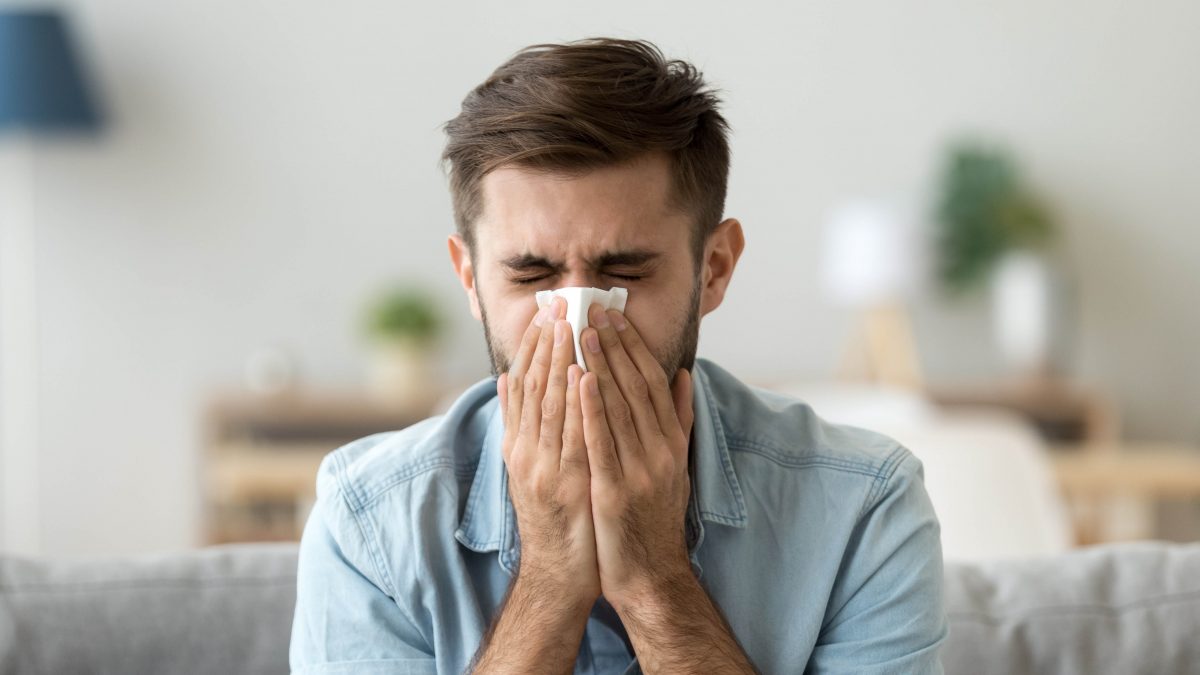There are many doctors and microbiologists who often warn people about how an air conditioner does not only cool the air but also subjects the human body to a serious test, thus weakening the immune system. You see, the greater the temperature difference, the harder it is for the body to defend itself. However, it’s unlikely for you to catch a cold just by sitting under the air conditioner. If you get sick or start sneezing, then it’s most likely due to a number of prevailing factors.
Is There Such a Thing as an Air Conditioner Allergy?
 The short answer is no, otherwise you would have been allergic to your refrigerator or your radio. So, why are you sneezing and coughing as soon as you turn on the air conditioning? The only possible explanation is that your air conditioning system is circulating certain airborne pollutants throughout your house, which are triggering your allergic reactions.
The short answer is no, otherwise you would have been allergic to your refrigerator or your radio. So, why are you sneezing and coughing as soon as you turn on the air conditioning? The only possible explanation is that your air conditioning system is circulating certain airborne pollutants throughout your house, which are triggering your allergic reactions.
If we go back to 1976 in Philadelphia, where an illness was first linked to air conditioning, you’ll find that a contaminated agent of a disease got circulated in the air through the ventilation system, which resulted in an entire hotel falling sick and contracting pneumonia.
Some common airborne pollutants that may be circulated by an air conditioning system are:
- Pet dander: Animals with fur, like cats and dogs tend to shed dander and this dander is then spread in the air through your air conditioning system, which eventually triggers an allergic reaction in you. Technically speaking, you are not allergic to the pet’s hair or fur, but you are allergic to the specific protein which is found in the pet’s dander. And, since these allergens are quite persistent and sticky, even if you cleaned your home, you’d still have significant allergens in the house for quite a while. From a purely medical standpoint, some would simply ask you to get rid of the pet if you want to get rid of the allergy. However, I’d suggest you regularly bathe the pet which can reduce the allergen load. You can also use medications to mask the symptoms of this allergy.
- Pollen: If you are allergic to pollen, more exposure can make your allergies worse. It can also affect your immune system, causing it to develop more allergies. There is the possibility of desensitization therapy which can build your tolerance so you are no longer reactive. This works for some people, but not everyone. So, I strongly suggest consulting an allergist to learn more about possible remedies and treatments.
- Mold: Mold is a living organism just like viruses and bacteria. As per the American Academy of Allergy, Asthma, and Immunology, there are thousands of types of molds, but the most common allergy-causing molds are Alternaria, Aspergillus, Cladosporium and Penicillium. Damp conditions allow mold to grow and thrive and when people inhale the tiny airborne mold spores, it produces an allergic reaction in those individuals who are sensitive to them. If these individuals are constantly exposed to this contamination, it can cause irreparable damage. However, there are several treatments available that can raise your immune system and if you want to learn more about them, click here.
- Dust mites: Dust mites are microscopic spider-like creatures that live mostly in mattresses. Why mattresses? Because they are dark and moist. Dust mites also live off the dead skin cells you shed while you sleep. The problem with these tiny creatures is that they give off allergens, which are known to affect around 10 % of the adult population. The solution is to have your mattress professionally steam cleaned every 6-12 months and to vacuum your mattress every time you change your bed sheets.
 These pollutants, when circulated in the atmosphere, can thus trigger allergic symptoms like sneezing, watery eyes, dizziness, coughing and tiredness. However, an uncleaned and unmaintained air conditioner can accumulate viruses, fungi and bacteria and when these contaminants are released into the air, they can trigger allergic reactions that would irritate your nose, ears and throat. So, if you want to avoid such dangerous health problems, make sure your air conditioner is regularly cleaned and maintained.
These pollutants, when circulated in the atmosphere, can thus trigger allergic symptoms like sneezing, watery eyes, dizziness, coughing and tiredness. However, an uncleaned and unmaintained air conditioner can accumulate viruses, fungi and bacteria and when these contaminants are released into the air, they can trigger allergic reactions that would irritate your nose, ears and throat. So, if you want to avoid such dangerous health problems, make sure your air conditioner is regularly cleaned and maintained.

